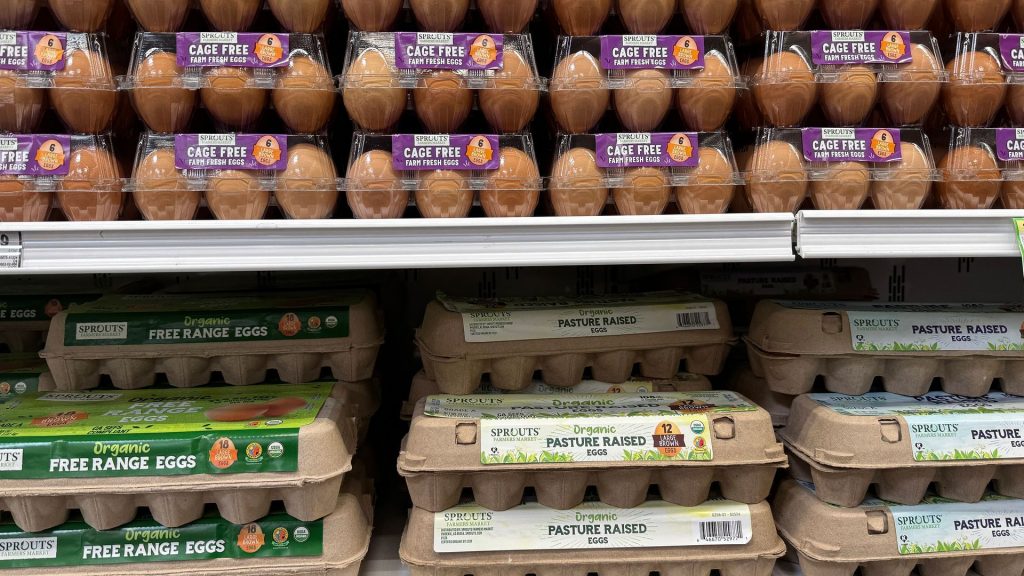DOJ lawsuit says California’s ‘cage-free’ laws contributed to rise in egg prices

The Trump administration has sued California and Gov. Gavin Newsom, accusing the state of contributing to the high cost of eggs through animal welfare laws. The administration states that federal law supersedes state law.
In a complaint filed on Wednesday, July 9, the U.S. Department of Justice argues that the state’s laws are unnecessary and harm consumers nationwide because suppliers in other states must comply with the requirements if they sell eggs in California.
“California has effectively prevented farmers across the country from using a number of agricultural methods which were in widespread use and helped keep eggs affordable,” the DOJ wrote in the court document.
It seeks to block California from mandating that farmers provide necessary space for egg-laying chickens.
The laws being challenged
The debate focuses on two California state laws, one passed in 2008 and the other in 2018. Those laws implemented stricter housing requirements for any hen that produces eggs sold in California. These changes included enough space for birds to extend their limbs and move around freely without touching another bird.
The 2018 initiative also prohibits chicken farmers from housing hens in any enclosure besides a cage-free housing system and requires additional space for breeding swine and calves raised for veal.
The Trump administration’s argument
The Trump administration claims that the Supremacy Clause of the U.S. Constitution and the Egg Products Inspection Act supersede the California laws. The administration also provided data that shows in the years after state lawmakers passed the first major law, egg production in California fell and egg prices rose by 20%.
The DOJ alleges the requirements “were driven by activists’ conception of what qualifies as ‘cruel’ animal housing, not by consumer purchasing decisions or scientifically based food safety or animal welfare standards.”
Animal rights activists defend laws
Animal rights advocates, such as the Humane Society of the United States, contend that the laws keep farm animals safe by preventing farmers from locking livestock in “cruel and extreme confinement.” They say that in many cases, egg-laying hens are confined to small cages.
“Locking farm animals in tiny cages is not only inhumane and cruel, it increases the risk of food safety threats like salmonella and E. coli, while also increasing the risk of another pandemic,” the Humane Society argued in 2023.
Newsom’s response
Newsom responded to the lawsuit on X, writing that President Donald Trump is “back to his favorite hobby: blaming California for literally everything. Next up: Gavin Newsom caused the fall of Rome and sent the asteroid that wiped out the dinosaurs.”
Bondi’s statement
U.S. Attorney General Pam Bondi also criticized California’s laws in a statement.
“Americans across the country have suffered the consequences of liberal policies causing massive inflation for everyday items like eggs,” Bondi said. “Under President Trump’s leadership, we will use the full extent of the law to ensure that American families are free from oppressive regulatory burdens and restore American prosperity.”
The first Trump administration unsuccessfully tried to sue California in 2016 and 2017 to block a rule that mandated hens be given additional space for housing. The Supreme Court declined to hear a challenge from the Trump administration in 2019 and dismissed a challenge to California’s 2018 animal confinement rule brought by the pork industry.
Egg prices fall from record highs
Egg prices across the U.S. sit at an average price of $4.55 per dozen as of May, down from a record high of $6.23 per dozen in March, according to federal data. Industry analysts blame the rise in price on the spread of bird flu worldwide.
However, the complaint from the DOJ doesn’t mention the bird flu as a contributing factor in its challenge of California’s laws.





